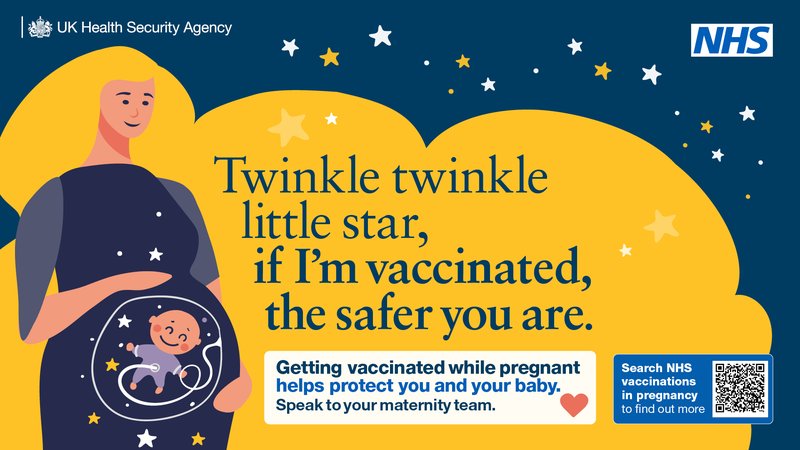Some vaccines, such as the inactivated seasonal flu vaccine and the whooping cough vaccine, are recommended during pregnancy to protect the health of you and your baby. An inactivated vaccine does not contain a live version of the virus it is protecting against.
Some vaccines, such as the tetanus vaccine, are perfectly safe to have during pregnancy if necessary.
But it does depend on the type of vaccination. For example, the MMR and yellow fever vaccines have potential risks, and you need to discuss these with your midwife or doctor before deciding whether to have the vaccine.

Vaccines recommended in pregnancy
Flu vaccine
During pregnancy, your immune system (the body’s natural defence) is weakened to protect the pregnancy. This can mean you’re less able to fight off infections such as flu.
Pregnant women are more likely to get flu complications (such as pneumonia) than women who are not pregnant, and are more likely to be admitted to hospital. Having the flu vaccine means you’re less likely to get flu, or if you do catch flu, it is less likely to be severe.
Whooping cough vaccine
Whooping cough can be a very serious infection, and young babies are most at risk. Most babies with whooping cough will be admitted to hospital.
When you have the whooping cough vaccination in pregnancy, your body produces antibodies to protect against whooping cough. These antibodies pass to your baby giving them high levels of protection against serious whooping cough illness until they’re able to have their whooping cough vaccination at 8 weeks old.
You usually have the whooping cough vaccine at 20 weeks pregnant, but you can have it from 16 weeks.
To give your baby the best protection against whooping cough, you should have the vaccine before 32 weeks of pregnancy. If for any reason you miss having the vaccine before 32 weeks, you can still have it later.
If you are 20 weeks pregnant and have not been offered the whooping cough vaccine, contact your midwife or GP surgery.
Find out more about the whooping cough vaccination in pregnancy
Respiratory syncytial virus (RSV) vaccine
Respiratory syncytial virus (RSV) is a common virus that causes coughs and colds. RSV usually gets better by itself, but it can be serious for babies.
RSV can cause serious lung infections (including pneumonia and bronchiolitis), which can make it difficult for babies to breathe and feed. These illnesses may need to be treated in hospital.
When you have the RSV vaccine in pregnancy, the protection from the vaccine is passed to your baby. This means your baby is less likely to get severe RSV for the first 6 months after they’re born.
You should be offered the RSV vaccine around the time of your 28-week antenatal appointment. Getting vaccinated as soon as possible from 28 weeks will provide the best protection for your baby. But it can be given later if needed, including up until you go into labour.
Speak to your maternity service or GP surgery if you are 28 weeks pregnant or more and have not been offered the vaccine.
COVID-19 vaccine
If you’re pregnant, or think you might be, it’s recommended you get vaccinated against COVID-19 to protect you and your baby.
You’re at higher risk of getting seriously ill from COVID-19 if you’re pregnant. If you get COVID-19 late in your pregnancy, your baby could also be at risk.
It’s safe to have the vaccine during any stage of pregnancy, from the first few weeks up to your expected due date.
The COVID-19 vaccines do not contain any live viruses and cannot give you or your baby COVID-19.
For further information on Vaccinations in Pregnancy visit the NHS website.
